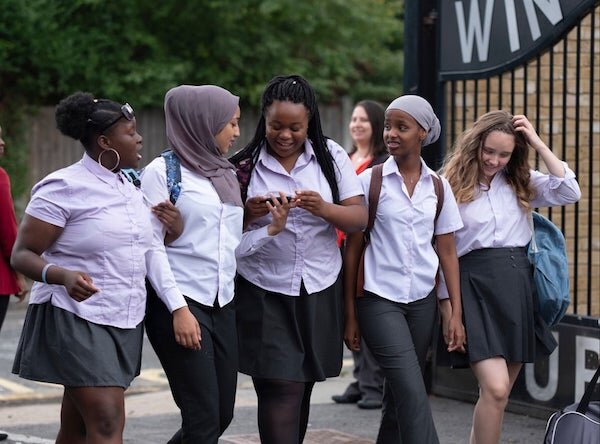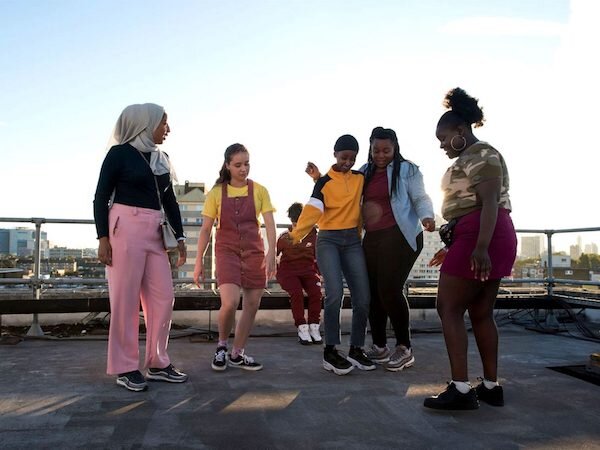One of the freshest and most authentic portraits of London girlhood, Rocks shines in its honesty. Made as much by its actors as its directors and writers, the film offers a joyful and moving snapshot of the youth of today. Maya Campbell chats to the creative team to explore the experience of making, and watching, the film.
Framing the bustling vibrancy of Hackney, Rocks crafts a touching portrait of a new definition of being British in 2020 and the power of female friendship in the face of hardship. The film stars a dynamic Bukky Bakray as Rocks, a teenage girl with ambitions to start her own makeup business. The dream quickly dissolves when she returns home from school to find her mum has vanished, leaving merely some money and an apology note. Determined to protect her younger brother Emmanuel (D’angelou Osei Kissiedu) from being taken into care, Rocks is forced to step into a parental role and provide stability to Emmanuel. At just 15, she decides to leave home and hide from the authorities that keep turning up on their doorstep, each day becoming harder to evade a fate that seems inevitable.
In conversation with the creative team, director Sarah Gavron tells me, “We’re all like the same person! We all did everything, that was what was unusual about this film”. An organic process allowed for a non-hierarchical creative collaboration between the cast and creative team, with Gavron highlighting this non-traditional approach. “We wanted to build the film with the young people that were in it,” she explains. “You come up with an idea and you go and find the cast. But we felt it was right to find the cast, the young people first, and build trust and a relationship and see who wanted to be on that journey with us.” The film evolved through a workshop process taking place over a year, in schools, drama clubs and youth clubs across East London. Through sitting in on Year 7, 8 and 9 classes, the team – writers Claire Wilson and Theresa Ikoko, alongside Gavon – decided to focus on the experience of girls in Year 9 and 10, due to profound changes occurring in physicality, worldview and the newfound realisations and realities of a complex, adult-driven world. There is an authenticity to the scenes shot in school – conspiratorial glances shared between girls right under the teachers’ noses, uniform rules ignored – created by an immersive research process. Rocks is reflective of the sisterhood that runs deep through an inner city girls’ school, with an ethnically and religiously diverse cast. It’s true to London, but a depiction that is scarcely shown so truthfully on-screen.
The story was initially conceived independently by Ikoko, as a love letter to her sister and Black and brown girls who she felt were too often denied a childhood by society, seen as tough and impenetrable. Wanting to celebrate the joy and softness beneath these sometimes hard exteriors, Bakray embodied this spirit perfectly from the start. “Bukky epitomised all of that in the way she carried herself, in every room she was both the anchor and the light,” Ikoko explains. “Claire always says the girls rose up like flowers. We saw so many girls, but this particular friendship dynamic really struck, and it felt like you had to have them all. Bukky was very clearly Rocks to me, and Sarah was the first to meet Kosar Ali [who plays Sumaya] and was really taken by her.” On the chemistry between Bakray and Ali, Ikoko remembers: “The first time they ever met they were so mischievous together that they got kicked out of the workshop and it was the first time Bukky had ever gotten into trouble!”
Ali’s performance as Sumaya, Rock’s loyal and grounded best friend, conveys a mix of strength and vulnerability – all the more impressive as Ali had never previously considered a career in acting. “I just didn’t think acting was an option for me,” she said. “I was encouraged more to be a doctor or an architect or a pilot… something that has respect in the eyes of my culture. But my family was incredibly supportive of me being in the film.” Bakray also recalled her longtime dreams of being an actor, without ever being given the chance. “I just knew it wasn’t a career path that was tangible for me,” she admitted. “There was no way I could be an actor, there were no opportunities.”
Most of the girls in Rocks were first-time actors, and were actively encouraged to help retool the script in the development process. “We had mapped out Theresa’s story on big sheets of paper and put them on the wall like blocks and beats,” Wilson explains. “We got all the girls to write on post-it notes and discuss what they felt about each beat which was really fun.” The girls were also invited to write diaries – Wilson explains it helped “to find a truth in themselves”. The commitment shines on-screen, from young women who were no more than 13 or 14 at the time. In Claire’s words, “We wanted the story to be reflective of the girls you see at the bus stop, who are laughing and look amazing – they aren’t celebrated enough. We wanted to ensure there was the space for the girls to create their own dialogue which had depth and sadness but also celebration.”
Watching Rocks, I felt truly seen and valued – growing up there were no films like this, framing girlhood in a multicultural London setting, without falling into lazy, racially-charged stereotypes. Britishness is explored through a questioning of youth in London, a conversation on friendship, on culture and traditions. “What does it feel like to be British outdoors and then come home and be Somali or come home and be Nigerian? To come home and be Polish Gypsy as Anastasia Dmitrov, who plays Sabina, describes herself,” Ikoko explains. “We are so much more alike than we are different.”
Music played a key role in creating a truthful world for these girls. “Affy, who plays Yawa was really into afrobeat and Anastasia listened to a lot of bashment, so they were all bringing different influences into the mix,” says Gavron. The final soundtrack includes an eclectic range of UK artists, influenced by the rich diversity pulsing through the heart of London. Fluidly moving through grime, dancehall and jazz, the music cues create a fresh London sound that animates the panoramic views of the city skyline and colourful street scenes in Hackney.
On set, Gavron was insistent on championing an approach that favoured shared ideas, and disillusionment of the ego. “There wasn’t any sense of, ‘This is your role and you stay out of it,’” Ikoko says. “It was always about deferring to who at that moment had the better way of doing it or wanted to try”. Claire echoes this sentiment, sharing how transformative the experience was. “It was like the difference between day and night, she says. “It was having a voice but really feeling like you weren’t just a tool, which can be a case when you’re a writer. You can feel like your work is taken but then you’re just pushed away, but when you get on set, the work continues. It breathes and it lives, and you’ve got so much more to give so this was really life-changing for me.”
Gavron made sure the women on set felt valued, with a crew that was 75 female. “We were trying to extend the atmosphere from the workshops where the young people felt at home and at ease and knew the team around them,” the director explains. “Once you expand onto a film set, we wanted them to feel these people understood the journey and the stories – they were largely women and from different backgrounds and different communities, so it could feel like a welcoming environment.” The film’s most captivating scenes see the girls roaring with laughter, singing and dancing and riffing off each other with a playful abandon that captures the spirit of a youth specific to London. After the social services separate Rocks and Emmanuel, the girls pool together to buy Rocks a ticket to visit him in Hastings on his birthday. They all jump the barriers, running away from the ticket inspector, piling onto the train together. In this scene and throughout Rocks, these girls embody the resilience, love and light that female friendships bring into our lives at all ages.
Maya Campbell (@mayajcampbell) is a South London based visual artist and writer who draws inspiration from femininity, nature and her dual cultural heritage. She is currently studying Photography at London College of Communication and running an online bookshop (@prajnabookshop) with her partner. Maya is presently researching the ancient practice of mask making, particularly the fetishisation within the African mask market.



